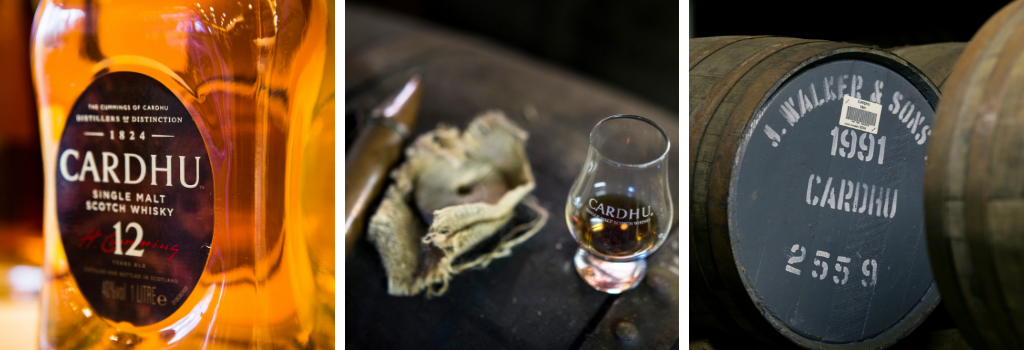
Cardhu

HISTORY AND HERITAGE
John and Helen Cumming first began illicit distilling in 1811. They were so successful, that in 1824 the distillery was licensed and named Cardhu. Cardhu is special. The distillery was successfully run by two generations of women- Helen and her daughter-in-law Elizabeth, who took over the running of Cardhu following the death of her husband Lewis. Both Helen and Elizabeth made Cardhu the whisky we know today, refining its flavour and character to produce an effortless, elegant, generous spirit, born of hard work and determination.
The origins of Cardhu trace back to 1811 when John Cumming and his wife Helen took over the lease of Cardhu farm. Like many of their farming neighbours, they took to illicit distilling, with Helen Cumming cleverly outwitting excise men by inviting them into her home, disguising the fermenting as baking, then slipping outside to alert her fellow distillers by flying a red flag.
John Cumming obtained a distillery licence, marking the official founding of Cardhu in 1824. In the years that followed, Cardhu very much became a family business, with all their sons all having a part to play in the business. Elizabeth Cumming resolved to keep the running of the business after the death of her husband, the Cumming’s eldest son, in 1872.
In 1893, Elizabeth sold the business to John Walker & Sons with the one condition that the family would still run the distillery. Before her death, Elizabeth had cottages with running water built for employees at the distillery, ensuring Cardhu remained at the heart of the community and keeping her mother-in-law’s legacy alive.
Cardhu is now one of the world’s leading single malt Scotch whiskies, distilled in one of the first legal distilleries on Speyside.
The brand’s most renowned expression is Cardhu 12-year-old with its rich, smooth, honeyed fruity flavours and light spiciness. Other variants are available for different styles and tastes.
Effortless, elegant, the generous spirit, Cardhu single malt scotch whisky flows like the conversation of excellent company. These smooth, sweet, mellow characters, drawn from the peat-softened waters of the Mannoch Hills, are the essential companion of any vivacious host.
1811
John Cumming and his wife lease a farm at Cardow – pronounced ‘Cardoo’ – and like other farmers near the river Spey, they begin small scale distilling.
1816
John Cumming is convicted three times for distilling without a licence – although it would likely be his wife Helen who was the distiller. Neighbours watch for a red flag flying at the Cumming’s home, Helen’s sign an excise officer was lodging with them.
1824
The Excise Act of 1823 reduces duty and farmer-distillers can afford to pay for a license. John Cumming is among the first to buy one. John’s son Lewis has many friends in the whisky industry, and they advise the Cummings to buy new stills for their fledgling distillery. George Smith, founder of Glenlivet, is one such friend – he buys and distributes Cardow’s whisky until the Cummings can find their own brokers.
1832
Lewis takes over the running of the distillery. Though it is described as the country’s smallest, Lewis earns Cardow a strong local reputation.

